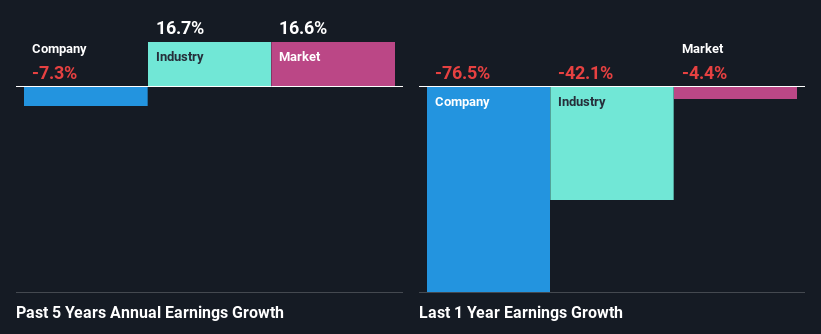- Israel
- /
- Real Estate
- /
- TASE:BLGO
Buligo Capital Ltd's (TLV:BLGO) Stock is Soaring But Financials Seem Inconsistent: Will The Uptrend Continue?

Most readers would already be aware that Buligo Capital's (TLV:BLGO) stock increased significantly by 10% over the past week. However, we wonder if the company's inconsistent financials would have any adverse impact on the current share price momentum. Particularly, we will be paying attention to Buligo Capital's ROE today.
Return on equity or ROE is a key measure used to assess how efficiently a company's management is utilizing the company's capital. In short, ROE shows the profit each dollar generates with respect to its shareholder investments.
See our latest analysis for Buligo Capital
How Is ROE Calculated?
Return on equity can be calculated by using the formula:
Return on Equity = Net Profit (from continuing operations) ÷ Shareholders' Equity
So, based on the above formula, the ROE for Buligo Capital is:
5.4% = US$3.5m ÷ US$64m (Based on the trailing twelve months to March 2024).
The 'return' is the yearly profit. Another way to think of that is that for every ₪1 worth of equity, the company was able to earn ₪0.05 in profit.
What Has ROE Got To Do With Earnings Growth?
Thus far, we have learned that ROE measures how efficiently a company is generating its profits. We now need to evaluate how much profit the company reinvests or "retains" for future growth which then gives us an idea about the growth potential of the company. Generally speaking, other things being equal, firms with a high return on equity and profit retention, have a higher growth rate than firms that don’t share these attributes.
A Side By Side comparison of Buligo Capital's Earnings Growth And 5.4% ROE
At first glance, Buligo Capital's ROE doesn't look very promising. We then compared the company's ROE to the broader industry and were disappointed to see that the ROE is lower than the industry average of 7.7%. Therefore, it might not be wrong to say that the five year net income decline of 7.3% seen by Buligo Capital was probably the result of it having a lower ROE. However, there could also be other factors causing the earnings to decline. For example, it is possible that the business has allocated capital poorly or that the company has a very high payout ratio.
That being said, we compared Buligo Capital's performance with the industry and were concerned when we found that while the company has shrunk its earnings, the industry has grown its earnings at a rate of 17% in the same 5-year period.

Earnings growth is a huge factor in stock valuation. It’s important for an investor to know whether the market has priced in the company's expected earnings growth (or decline). Doing so will help them establish if the stock's future looks promising or ominous. One good indicator of expected earnings growth is the P/E ratio which determines the price the market is willing to pay for a stock based on its earnings prospects. So, you may want to check if Buligo Capital is trading on a high P/E or a low P/E, relative to its industry.
Is Buligo Capital Using Its Retained Earnings Effectively?
Looking at its three-year median payout ratio of 28% (or a retention ratio of 72%) which is pretty normal, Buligo Capital's declining earnings is rather baffling as one would expect to see a fair bit of growth when a company is retaining a good portion of its profits. So there could be some other explanations in that regard. For instance, the company's business may be deteriorating.
Summary
Overall, we have mixed feelings about Buligo Capital. While the company does have a high rate of reinvestment, the low ROE means that all that reinvestment is not reaping any benefit to its investors, and moreover, its having a negative impact on the earnings growth. Wrapping up, we would proceed with caution with this company and one way of doing that would be to look at the risk profile of the business. To know the 3 risks we have identified for Buligo Capital visit our risks dashboard for free.
Valuation is complex, but we're here to simplify it.
Discover if Buligo Capital might be undervalued or overvalued with our detailed analysis, featuring fair value estimates, potential risks, dividends, insider trades, and its financial condition.
Access Free AnalysisHave feedback on this article? Concerned about the content? Get in touch with us directly. Alternatively, email editorial-team (at) simplywallst.com.
This article by Simply Wall St is general in nature. We provide commentary based on historical data and analyst forecasts only using an unbiased methodology and our articles are not intended to be financial advice. It does not constitute a recommendation to buy or sell any stock, and does not take account of your objectives, or your financial situation. We aim to bring you long-term focused analysis driven by fundamental data. Note that our analysis may not factor in the latest price-sensitive company announcements or qualitative material. Simply Wall St has no position in any stocks mentioned.
About TASE:BLGO
Buligo Capital
Flawless balance sheet unattractive dividend payer.
Market Insights
Community Narratives




